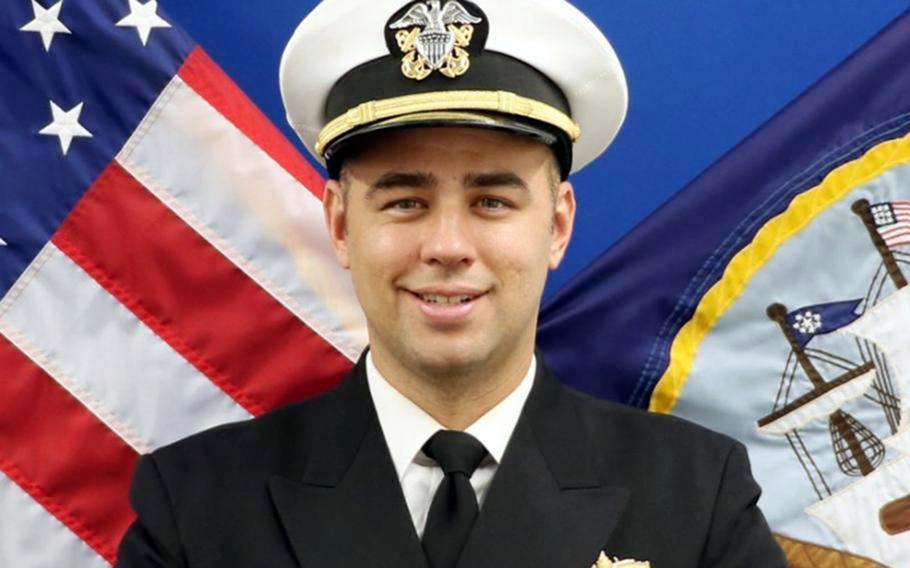
Navy Lt. Ridge Alkonis crashed his car into pedestrians and parked vehicles at a soba restaurant parking lot in Fujinomiya, Japan, May 29, 2021. (U.S. Navy)
Japanese authorities went by the book handling the case against a Navy officer for the negligent-driving deaths of two Japanese citizens in May 2021, according to a Japanese lawyer who’s represented U.S. service members.
Lt. Ridge Alkonis, 34, who was based at Yokosuka, reported July 25 to begin serving his three-year sentence in a Japanese prison. His supporters, including a U.S. senator and a representative, urged President Joe Biden’s administration to get Alkonis freed. They allege the father of three was mistreated by Japanese police, who illegally held him nearly a month, and was denied a fair trial by the Japanese courts.
Yasutoshi Murakami, an attorney with the Higashi Koenji Law Firm in Tokyo who has prosecuted and defended cases involving individuals covered by the status of forces agreement between the U.S. and Japan, disagreed.
“In the case of Alkonis, he was arrested off-base in flagrante delicto - or immediately following the crime - which means the police saw the need to arrest him because of flight risk and/or danger of destroying evidence,” he told Stars and Stripes by phone Friday.
Murakami said the length of Alkonis’ detainment was also by the books.
Suspects in criminal cases may be held up to 23 days without an opportunity to post a release bond until they’re formally charged, according to information from the Japan Federation of Bar Associations.
Alkonis was charged on June 18, 2021, 20 days after his arrest. The additional six days of detention were legal because they came after the official charges, Murakami said.
A judge in Shizokua District Court convicted Alkonis on Oct. 18 of negligent driving causing death; the Tokyo High Court dismissed Alkonis’ appeal on July 13. He had pleaded for a suspended sentence.
His family have pinned their last hopes to free him on several U.S. politicians, family spokesman Jonathan Franks told Stars and Stripes by phone on Tuesday.
Sen. Mike Lee, R-Utah, and Rep. Mike Levin, D-Calif., both allege that prosecutors violated sections of SOFA, the agreement that governs the rights and responsibilities of individuals in Japan with the U.S. military. SOFA covers service members but also Defense Department civilian employees, contractors and their families.
Levin, in a Friday email to Stars and Stripes, argued that Japanese authorities didn’t demonstrate “adequate cause and necessity” to keep Alkonis in custody as required by the agreement.
Alkonis was driving with his family after a hike on Mount Fuji on May 29, 2021, when his car plowed into pedestrians and parked cars outside a restaurant in Fujinomiya, about two hours from Yokosuka.
A woman, 85, died that day; her son-in-law, 54, died June 11, 2021. A second woman, 53, the daughter and wife of the other victims, was injured.
The only reason to keep Alkonis in custody afterward was “a fear that he would destroy evidence, which in this case is impossible,” Franks said, “or evidence that he was a flight risk, which is really not realistic because Japan is an island, and the Navy has his passport.”
Alkonis testified Aug. 24 that a case of acute mountain sickness caused him to lose consciousness behind the wheel. The district court and appellate court dismissed his argument.
Franks alleged that a second SOFA violation occurred during Alkonis’ trial, when a court-appointed translator made several errors, including incorrectly translating the term “acute mountain sickness” into “altitude sickness.” He said the two are medically distinct.
The Centers for Disease Control and Prevention defines altitude sickness as a group of three syndromes, the mildest and most common of which is acute mountain sickness.
SOFA requires that a “competent interpreter” be made available if necessary.
The court’s refusal to admit a Navy medical exam as evidence, and Japanese law enforcement’s failure to conduct its own exam, constitutes an unfair trial and a third possible violation, Franks said.
Lee, during a July 25 speech on the Senate floor, said the Japanese government “didn’t so much as bother to conduct an adequate investigation” and were possibly “trying to make an example" of Alkonis.
He also called on the U.S. government to “take every step possible” to negotiate with Japan and “bring Ridge home.”
Levin made similar comments and said he’s working to ensure that any SOFA violations are addressed.
Murakami said if there were any suspected SOFA violations, Alkonis’ attorneys and U.S. Forces Japan should have raised those concerns with the court.
The U.S. Embassy in Japan and Naval Forces Japan referred all questions regarding the case or SOFA to USFJ. USFJ acknowledged Stars and Stripes’ request for comment on Friday, but as of Wednesday had not responded.